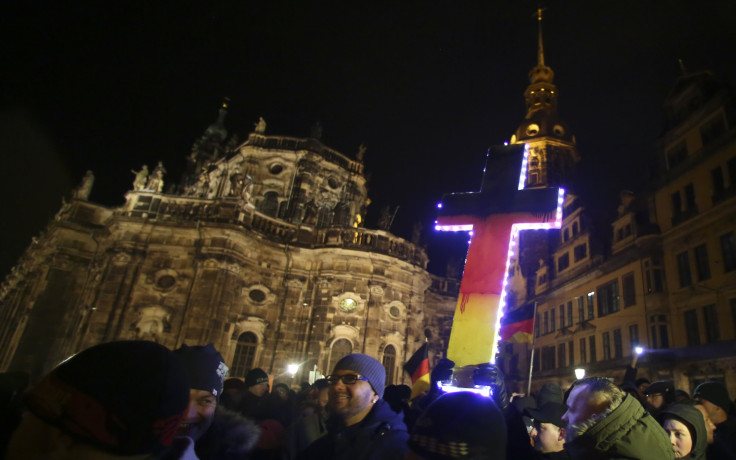Germany Protests 2014: Protesters Sing Christmas Carols At Anti-Islam March

Germany’s latest “anti-Islamization” rally has attracted a record turnout, with 17,500 people estimated to have taken part in a Monday night march in the eastern city of Dresden. Protesters sang Christmas carols as organizers made speeches about immigrants and asylum seekers, according to the BBC.
The weekly rallies, organized by the “Patriotic Europeans against the Islamisation of the West,” or Pegida, movement, have seen steadily growing numbers in recent weeks. The far-right populist group says it initiated the protests in October to counter the spread of Islam in Europe, though the message of the rallies has since broadened to include anti-immigrant views.
“Germany is not a land of immigration. Integration does not mean living beside each other, but to live together on the basis of the Christian-Jewish merits of our constitution and our German culture with its Christian-Jewish roots, determined by Christianity, humanism and enlightenment,” said the group’s leader, Lutz Bachmann, in an address to the crowd on Monday, according to Euronews.
Pegida supporters describe the group as simply educational.
“I feel that their mission is to educate people about the dangers of radical Islam and not let the Muslims impose their ‘beliefs’ on non-Muslims,” Gary Hochenstein said.
German Chancellor Angela Merkel had previously sounded the alarm about the group’s aims, warning Germans not to allow themselves to be exploited by extremists. Other senior politicians have also come out against the movement, including Ralf Jäger, an interior minister for the North Rhein-Westphalia state, who described the group’s members as “neo-Nazis in pinstripes,” according to Deutsche Welle. Significant counter-demonstrations have also taken place across Germany, which remains sensitive to public expressions of xenophobia.
The wave of protests has also sparked concerns that Germany’s economy, the largest in Europe, could suffer if skilled foreign workers are deterred from moving to the country, reported Bloomberg. German industry relies heavily on foreign labor, an issue that has been directly in Pegida’s crosshairs as it advocates for stricter immigration measures and regulations on asylum seekers.
Immigration has become an increasingly fraught subject in Germany following a recent surge of asylum seekers as a result of the conflicts in Iraq and Syria. The country is currently the largest destination for asylum seekers in the European Union, with an expected 200,000 asylum applications in 2014, according to the BBC.
© Copyright IBTimes 2024. All rights reserved.






















